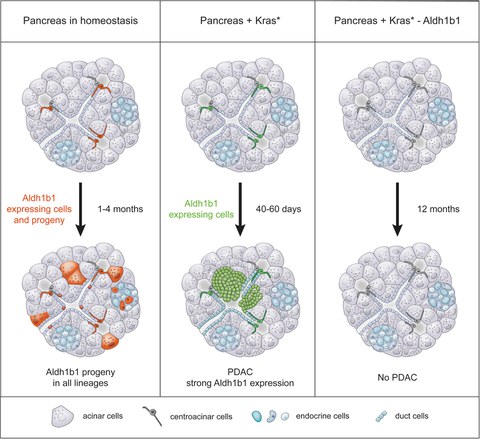Oct 23, 2019
Aldh1b1 expression marks adult pancreatic progenitor cells and is required for Kras-induced pancreatic cancer
Diabetes and pancreatic cancer are devastating diseases of the pancreas. Thus, the identification of organ-specific adult progenitor/ stem cells is important for understanding their origin and designing therapeutic interventions. Researchers of the Paul Langerhans Institute Dresden and the Helmholtz Zentrum München, together with colleagues from the Biomedical Research Foundation of the Academy in Athens found that rare Aldh1b1 expressing cells are progenitor cells in the adult mouse pancreas and that Aldh1b1 is required for tumor development in a pancreatic cancer mouse model. These findings suggest that these cells play a key role in pancreas homeostasis and pancreatic cancer development and potentially constitute a therapeutic target for pancreatic cancer. The results of this international research project have now been published in the renowned journal “Proceedings of the National Academy of Sciences of the United States of America (PNAS)”
The identification of organ-specific adult progenitor/stem cells is important for understanding the origin of diseases and designing therapeutic interventions. Examples for this are diseases such as diabetes and pancreatic cancer, which are two devastating diseases of the pancreas. The adult pancreas can respond to injury or metabolic stimuli to repair damage and regulate cell numbers. However, there is an ongoing debate whether this is a result of the inherent plasticity of terminally differentiated cells or due to the presence of unidentified rare adult pancreatic stem/progenitor cells. A similar controversy concerns the cell of origin of pancreatic ductal adenocarcinoma (PDAC), which is one of the most lethal among malignancies.
“In more than 90% of the cases, PDAC is initiated by an oncogenic mutation of the GTPase Kras”, explains Dr. Anthony Gavalas, research group leader at the Paul Langerhans Institute Dresden of the Helmholtz Zentrum München at the University Hospital and Faculty of Medicine Carl Gustav Carus at TU Dresden, who is the senior author of the study. “Recently we identified a small population of self-renewing progenitor cells in the adult mouse pancreas, that are characterized by the expression of a mitochondrial enzyme called Aldh1b1. Interestingly, these cells give rise to all three cell types, namely endocrine, ductal and acinar cells, in the organ during adult life”, Dr. Gavalas continues.
“In the present study we used single cell gene expression analysis and found that these Aldh1b1-positive progenitor/stem cells preferentially express Kras, mutations of which account for more than 90% of the cases of pancreatic cancer” says Dr. Ekaterina Mameishvili, the first author of the study, and Dr Ioannis Serafimidis, a key author of the study adds: “Our investigations further revealed that Aldh1b1 function is required for pancreatic cancer development, suggesting that these cells play a key role in the disease. The mechanism by which Aldh1b1 activity enables Kras-mediated oncogenic transformation requires additional investigations, however it seems that we have identified a potential new therapeutic target for pancreatic cancer.”
Original publication:
Aldh1b1 expression defines progenitor cells in the adult pancreas and is required for Kras-induced pancreatic cancer. Mameishvili E, Serafimidis I, Iwaszkiewicz S, Lesche M, Reinhardt S, Bölicke N, Büttner M, Stellas D, Papadimitropoulou A, Szabolcs M, Anastassiadis K, Dahl A, Theis F, Efstratiadis A, Gavalas A. Proc Natl Acad Sci U S A. 2019 Sep 23. pii: 201901075. doi: 10.1073/pnas.1901075116. [Epub ahead of print]
Link: https://www.pnas.org/content/early/2019/09/17/1901075116.long
Contact:
Dr. Anthony Gavalas
Paul Langerhans Institute Dresden at the Helmholtz Center Munich and the University Clinic Carl Gustav Carus and Medical Faculty of the TU Dresden
Fetscherstraße 74
01307 Dresden
Germany
Email: anthony.gavalas@tu-dresden.de
Phone: +49 351 458 82002
Fax: +49 351 796 36698
Internet: https://tu-dresden.de/med/mf/plid/forschung/Gavalas

